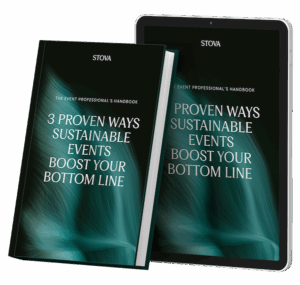Hybrid Events: 16 Questions to Ask Before You Plan
June 17, 2020
The vaccine is here! As event organizers, naturally, we’re all itching to get back to planning live, in person events. But it in the short term, with the continued threat of COVID-19 and recommendations against large, face-to-face gatherings, going back to live still presents a challenge.
Enter the immediate future of the event industry: the hybrid event.
A hybrid event strategy will enable organizers to supplement their audience with online participants while hosting smaller live audiences.
But because they involve face-to-face and virtual participants, hybrid events come with their own unique set of planning challenges.
As a planner, we know the decision to host face-to-face attendees might be one of the most important choices you’ll ever make.
To help you decide if a hybrid event is right for you, we’ve compiled 16 of the top questions you’ll want to consider before you start planning.
16 Questions to Ask Before Planning a Hybrid Event
1. What is a hybrid event?
A hybrid event is a meeting, event, conference, or trade show that combines an in-person component with an online or digital experience. With a hybrid event, the scope of the digital component can vary widely and encompass everything from Twitter chats or flipped classrooms to live stream sessions and virtual networking experiences. There’s no set rule for what a hybrid format should be in 2021, so you get creative with what makes the most sense for your event, audience, and goals.
2. How is a hybrid event different from a virtual event?
Unlike a virtual event, which takes place exclusively online with a virtual audience, a hybrid event also has in-person attendees.
3. What are some advantages of hybrid events?
A hybrid event is the natural step for event organizers who want to take a first step toward going back to live events but may face government restrictions or participants who are hesitant to travel and gather in groups. But that’s not the only benefit. Hybrid events come with some additional unique advantages, including unlimited scalability, cost effectiveness, increased reach and ROI, valuable data collection and audience insights, and a powerful unified message that can reach people anywhere.
4. What are some challenges of hybrid events management?
Virtual and live audiences have different needs. To create a unified event experience, you’ll need to account for the needs of both audiences. Some things to consider: How do you adapt content and create a digital experience that keeps your virtual audience as engaged as your in-person participants? Do you need additional moderators to facilitate discussions with the online audience? Are you ready to invest in the additional health and safety resources to enable your live audience to meet face-to-face? With social distancing still in effect, how do you create an in-person experience that makes your live participants feel special?
5. Is there a strong enough reason to meet face-to-face?
This is a question that only you and your organization can answer. While COVID-19 remains a threat, you’ll need to weigh carefully the pros and cons of meeting in-person and decide if the rewards of a face-to-face event outweigh the risks. While virtual will never completely replace in person, virtual event platforms have come a long way. You may decide it makes more sense to go all virtual until it’s safer to hold large gatherings. If you decide you do want to move forward with a hybrid event, here’s a helpful resource on event safety.
6. How many attendees do I want to have at my event?
This is an important question. As you research venues, be sure to plan for fewer participants in a live event space to account for social distancing and health regulations. If your event takes place in the near future, plan for fewer in-person attendees and more online participants. If you want to attract the largest audience possible, you’ll need to add a virtual component as well.
7. Who is my audience?
You never want to make assumptions; however, the age of your audience or their profession may affect your in-person turn-out. If most of your audience is over 50, they may be less willing to risk gathering face-to-face where a younger audience may be more open to it. An audience made up of healthcare professionals may also tend to be more conservative about meeting face-to-face than an audience of software developers.
8. Will a hybrid event require more internal planning resources?
Making your event available in person and virtually may require additional planning resources. Our advice is to be picky about your partners and select one who will not only listen to your goals, but understands all aspects of planning live and virtual events to help you make the right decisions for your event.
9. What room set-up do I need to account for social distancing?
Work closely with your venue to create room set-ups that account for social distancing. As an example, if your room set-up for an event is normally theater-style or round-tables, you may need to space your theater seating further apart or have fewer attendees at round tables.
10. Do I need different marketing strategies for a hybrid event than I would a face-to-face event?
To market a hybrid event, utilize the same channels you use to market live events such as social media, content marketing, email marketing, paid advertising, etc. Check out some inbound marketing strategies for event professionals.
What you need to plan differently is the timing of your marketing efforts. At Stova, as we’ve helped our clients switch to virtual events, they’ve seen registration numbers increase dramatically the week before their event and even past their event’s start date. This is a different trend than what planners typically see with in-person events. To maximize your online audience, you’ll want to increase marketing efforts the week before your event takes place.
11. Do a hybrid event’s in-person and digital sessions need to take place at the same time?
When people imagine a hybrid event scenario, many envision live in-person sessions being simultaneously live-streamed to a virtual audience. This is a common misconception. Live streams may make sense for some events but they’re not the only option. More and more event organizers are taking advantage of pre-recorded content and semi live sessions. The advantage of pre-recorded content is that presenters can be recorded and their sessions are made available to online audiences at any time. An example of a semi-live session is when a virtual audience watches a pre-recorded session and then the presenter “goes live” to answer questions via audio or video. With a hybrid event using semi-live sessions for the virtual component, the timing and possibilities with online sessions and breakouts are much more flexible.
12. How should I adapt my content for online participation?
Remember, live online audiences simply do not have the same attention span. We encourage you to provide more breaks for your virtual participants and in general, provide them with shorter content. If you plan to stream your live in person sessions, you’ll need to shorten your sessions to accommodate both audiences.
13. How can I provide networking for my hybrid event audience?
If networking is an important reason people attend your event, you’ll need to create robust networking experiences for both your live and online audiences. For example, you may decide to host a networking lunch or reception for your face-to-face participants. Or, with your mobile event app, you can make networking easy and match attendees with other like-minded attendees who they want to meet. You can provide similar networking opportunities with your virtual audience through BOF networking rooms and a AI driven attendee matching algorithm that makes online networking recommendations. Utilizing the same event app and virtual platform provider will help you create a more cohesive experience for all of your event attendees.
14. How do I keep my virtual audience as engaged as my face-to-face attendees?
Here’s the deal. Engagement is more than just answering an audience response poll or participating in Q&A. Those are important but they are just part of the picture. To feel included, online attendees want to interact with each other, the presenters, network, participate in games, post on a social wall, etc. They want to do the same things they would do if they travelled to your onsite event. As we mentioned above, virtual event software has come a long way in helping you achieve awesome experiences virtually. With a hybrid event, the secret to keeping your entire audience engaged is to make sure that your onsite audience and online attendees have the same engagement features available to them, whether they are face-to-face or virtual. You’ll also want to host shorter sessions and provide even more networking opportunities for your virtual audience.
15. Will my exhibitors need additional representatives for the online experience?
Remember, your virtual audience is just as important to your sponsors and exhibitors as your in-person audience. Encourage your exhibitors to have representatives available to speak with attendees in your live exhibit hall and host live office hours in your virtual exhibit hall. You never know when or where a valuable connection will be made! Check out this article on virtual event sponsors and exhibits for ideas.
16. What are some hybrid event ideas for my next event?
Here are a few ideas for creating a hybrid event that excites both your in-person and virtual audiences:
- Virtual tickets – improve event registrations by selling a virtual ticket at a reduced price.
- Hold simultaneous networking receptions on-site and virtually. Live stream a camera feed of the live networking reception to virtual attendees. In the live session, have screens that display BOF networking sessions online.
- Planning entertainment at your on-site event? Live stream the entertainment to your virtual audience. If your entertainment is a big-ticket name, like an actor, comedian, or musical group, host a live fan Q&A chat for your virtual audience.
Let’s recap. We’ve shared some important questions to ask yourself and your team before you start planning a hybrid event. Now it’s up to you to make it happen.
If you’re interested in learning more about how Stova supports hybrid events with our mobile event app and virtual event platform, get in touch.
Whether your event is virtual, hybrid, or in-person, enhance your attendee’s journey with an event ecosystem built for your audience. Ready to walk through Stova's event technology solutions? Schedule some time with us today.




